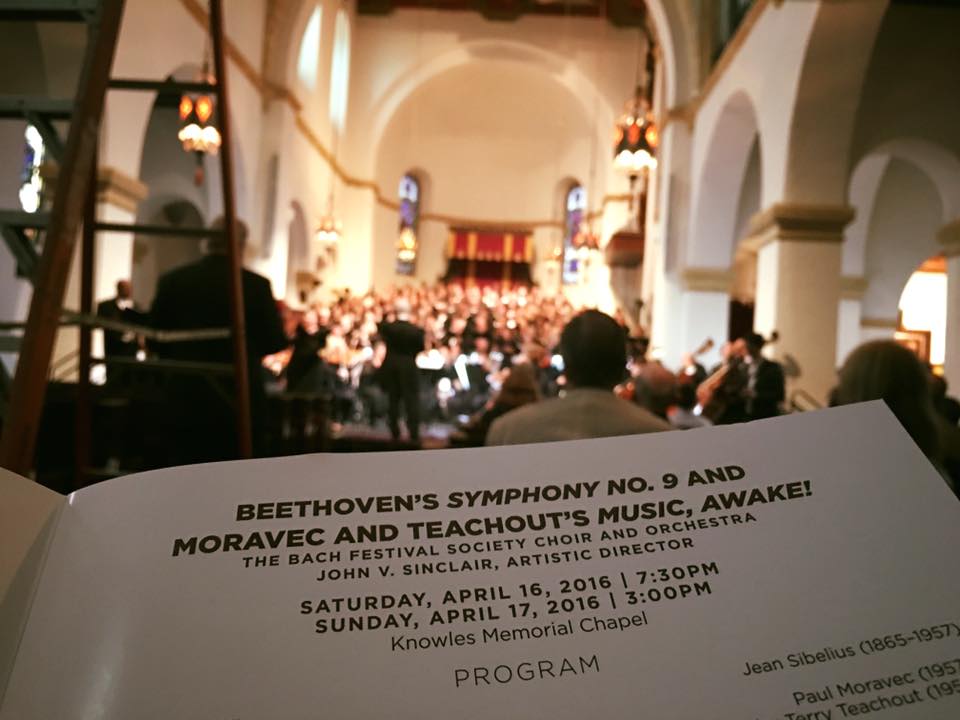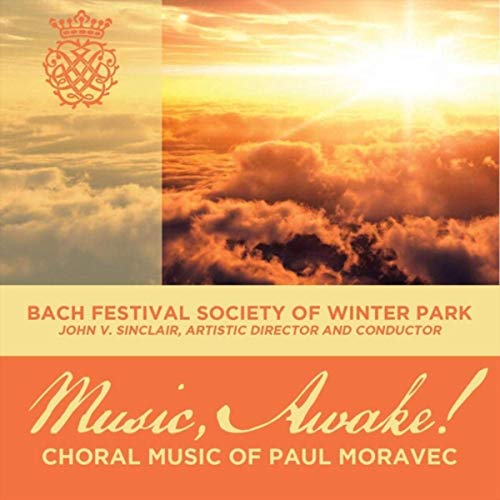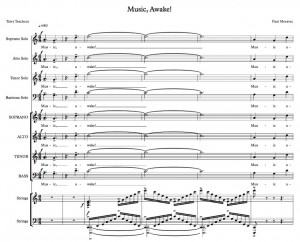Bill “Bojangles” Robinson and Shirley Temple dance together in The Little Colonel, directed in 1935 by David Butler:
(This is the latest in a series of arts- and history-related videos that appear in this space each Monday, Wednesday, and Friday)
Terry Teachout on the arts in New York City
Bill “Bojangles” Robinson and Shirley Temple dance together in The Little Colonel, directed in 1935 by David Butler:
(This is the latest in a series of arts- and history-related videos that appear in this space each Monday, Wednesday, and Friday)
“And then, the French put things so well—so clearly. They are not afraid of platitude.”
Maurice Baring, Cat’s Cradle

Three years ago this past April, my old friend John Sinclair and the Bach Festival Society Choir and Orchestra of Winter Park, Florida, gave the world premiere of my most recent collaboration with Paul Moravec, Music, Awake! It’s an anthem for soloists, chorus, and orchestra, an ode to music for which I wrote the text, my first (and, so far, only) poem.
The occasion was John’s twenty-fifth anniversary as artistic director of the Bach Festival Society. It had a unique importance for me as well, for it was John’s presence at Winter Park’s Rollins College that inspired Mrs. T and me to start spending parts of our winters in Florida, which led in due course to all sorts of other hitherto unimaginably good things. Just six days after the Music, Awake! premiere, for instance, I flew back down to Florida to start rehearsing Palm Beach Dramaworks’ production of Satchmo at the Waldorf, my professional debut as a stage director. For both of us, Florida had by then become a home away from home, and we’re more than eager for Mrs. T to receive the double lung transplant that will ultimately allow us to go back there again.

It is for this reason that we welcome with special excitement the release this week of Music, Awake! Choral Music of Paul Moravec, a new album that contains gloriously well-performed studio recordings by John Sinclair and the Bach Festival Society of five of Paul’s works for chorus and orchestra. The pieces themselves are all superb—Paul is one of the best choral composers I know—but it stands to reason that I should have special feelings about the fact that Music, Awake! is now available to the public.
I still recall with the utmost vividness what it felt like to hear Music, Awake! being rehearsed by flesh-and-blood singers and instrumentalists for the very first time. Naturally, I wrote about the experience in this space shortly after the fact, but I didn’t have to look up that posting to remember every word of it:Not finding John in his office, I pulled open a door across the hall and found him warming up the choir that would be singing the first performance that evening. I got a round of applause from the members of the choir, who proceeded to perform Music, Awake! for me. It was the first time that I’d heard it done by actual human beings (as opposed to the synthesized version on my MacBook). I was overwhelmed by the unexpected sound of my words being sung by a large, enthusiastic choir, so much so that I actually started crying—though I did have the presence of mind to remind the singers to be sure and hit the consonants hard at the concert!

I can’t imagine what else life will hold in store for me from here on out, but any man not content with the bounties that have already been showered upon me doesn’t deserve to be nearly as happy as I am.
* * *
To listen to Music, Awake!, go here. To download Music, Awake! Choral Music of Paul Moravec, go here. To read my program notes for the premiere performance of Music, Awake!, go here.John Sinclair talks in 2016 about the commissioning of Music, Awake! and his years with the Bach Festival Society:
In today’s Wall Street Journal “Sightings” column I describe one of my favorite academic pursuits, a choice example of which has lately made it into the news. Here’s an excerpt.
* * *

To a literary scholar, few things are so exciting as to discover something hitherto unknown about a great writer of the past. A couple of weeks ago, Jason Scott-Warren, a fellow of Cambridge University, hit a double: He announced that the copy of Shakespeare’s First Folio of 1623 owned by the Free Library of Philadelphia contained numerous handwritten annotations that appear to have been made by none other than John Milton, the author of “Paradise Lost.” Other scholars promptly chimed in to agree that Philadelphia’s First Folio looked like the real right thing—a book once owned by Milton himself in whose margins he had scribbled notes, some terse and others discursive, about the printed texts of Shakespeare’s plays. These notes give us, Mr. Scott-Warren said in an interview with the Guardian, “the opportunity to read Shakespeare through Milton’s eyes.”…
Unlikely as it may sound, the study of such annotations is a recognized academic specialty, albeit an arcane one. There’s even a word for them, “marginalia,” coined by the poet Samuel Taylor Coleridge, the author of “Kubla Khan” and “The Rime of the Ancient Mariner.” Coleridge scrawled so compulsively in the margins of the books he read that six fat volumes of his collected works are devoted to his own marginalia, some of which are as memorable as full-length essays. Here, for instance, is what he had to say about a priggish remark made by one of Milton’s biographers: “The man who reads a work meant for immediate effect on one age, with the notions & feelings of another, may be a refined gentleman, but must be a sorry Critic.” Bull’s-eye!…
* * *
Read the whole thing here.“After luncheon, we played prisoner’s base, and I at once realised that there is a vast difference between games and play. Play is played for fun, but games are deadly serious, and you do not play them to enjoy yourselves.”
Maurice Baring, The Puppet Show of Memory
Count Basie’s band, introduced by Steve Allen, performs at New York’s Birdland. This performance is an excerpt from a rare kinescope of The Steve Allen Show, originally telecast by NBC on July 22, 1956:
(This is the latest in a series of arts- and history-related videos that appear in this space each Monday, Wednesday, and Friday)
“Memory is the greatest of artists, and effaces from your mind what is unnecessary. What is necessary and what is wanted comes mysteriously at the beck and call of the artist.”
Maurice Baring, Have You Anything to Declare?
From 2005:
Read the whole thing here.George Bernard Shaw and Virgil Thomson, the two greatest music critics of modern times, got all sorts of things wrong, but even at their most willful they never failed to be both interesting and artful. I’d rather read Thomson on, say, Paul Hindemith (whom he completely misunderstood) than Olin Downes on anything, even though Downes was more likely than Thomson to be “right” on any given subject. The trouble with Thomson is that he was violently prejudiced and thus unreliable. The trouble with Downes is that he was boring. Whom would you rather read?…
| M | T | W | T | F | S | S |
|---|---|---|---|---|---|---|
| 1 | 2 | 3 | 4 | |||
| 5 | 6 | 7 | 8 | 9 | 10 | 11 |
| 12 | 13 | 14 | 15 | 16 | 17 | 18 |
| 19 | 20 | 21 | 22 | 23 | 24 | 25 |
| 26 | 27 | 28 | 29 | 30 | 31 | |
An ArtsJournal Blog